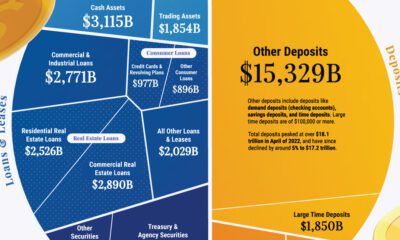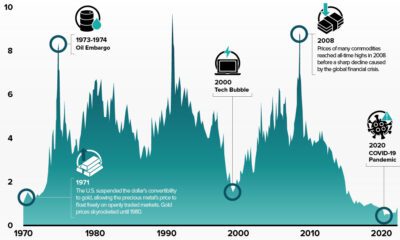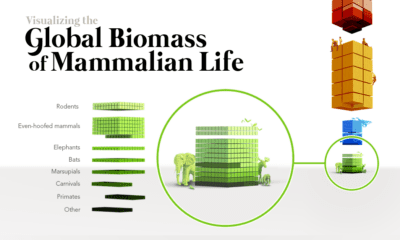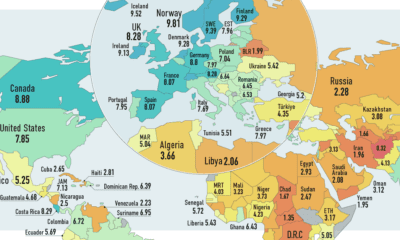
Written By Rida Khan
Graphics & Design
- Sabrina Fortin
Published May 3, 2023
•
Updated May 3, 2023
•
The following content is sponsored by Scottish Mortgage Investment Trust

The Atmospheric Rise of Cloud Computing
From the dawn of civilization right up until 2003, human beings generated 5 exabytes of stored information. Now this is created every two days.
And by 2025, half of all the world’s data will be found on the cloud, allowing people to save, control, and work with it remotely or in any other setting. In the infographic above, sponsored by Scottish Mortgage Investment Trust, we dive into everything you need to know about the atmospheric rise of cloud computing.
What Does The Cloud Hold?
Many types of data, from text files, images, and videos to large archives and applications data, are stored on the cloud.
Today, the average employee uses 36 cloud-based services daily, and corporations as a whole store about 60% of their data on the cloud.
Different cloud storage services have been created based on this growing demand. Consequently, there are four main cloud storage systems according to Spiceworks:
- Private cloud storage: The data and resources in a private cloud are not typically shared with other organisations or users. This is suitable for large enterprises.
- Public cloud storage: Available to the public and is managed by a third-party provider. The resources and data in a public cloud is shared among multiple users and organisations.
- Hybrid cloud storage: Combines both private and public cloud infrastructure. This allows organisations to use the public cloud for non-sensitive data and the private cloud for sensitive data. This is therefore more suitable for small and mid-sized companies.
- Community cloud storage: Shared among organisations with similar goals, policies, and security requirements. The organisations or a third-party provider can manage the community cloud. It is suitable for financial, health, legal, compliance systems, etc.
Types of Cloud Storage Infrastructure
Cloud storage systems require physical infrastructure, and the primary types are:
- Data warehouses are storage houses that collect data from various sources and organise it into a single format. They allow fast information processing and analysis. This makes them a good choice for business intelligence (BI) and data-driven work.
- Data lakes store raw data in their original format. They efficiently handle batch processing and are ideal for data scientists and engineers working with raw data.
- Data lakehouses offer the combined services of warehouses and lakes.
Individuals and organisations can increase flexibility and responsiveness when analysing data by using data warehouses’ processing power and data lakes’ storage size, both of which are becoming larger and more powerful each year.
Current Market Value and Future Projections
Despite the global cloud storage market being just one segment of the overall cloud computing market, it is expected to reach over $376 billion with a compound annual growth rate (CAGR) of 24%.
| Year | Global Market Value ($ Billion) |
|---|---|
| 2021 | $70.2 Billion |
| 2022 | $87.0 Billion |
| 2023 | $107.9 Billion |
| 2024 | $133.8 Billion |
| 2025 | $165.3 Billion |
| 2026 | $203.6 Billion |
| 2027 | $250.4 Billion |
| 2028 | $307.5 Billion |
| 2029 | $376.1 Billion |
The fastest-growing regions for the cloud storage market are the Middle East and Africa. Moreover, the fastest-growing segment is backup and disaster recovery.
The fast expansion of cloud computing as a whole is expected to catapult the market to a staggering $947.3 billion by 2026—almost double what it was in 2022.
Cloud Storage Vs. Cloud Computing
Cloud computing and cloud storage are often used interchangeably but are not the same. Cloud computing provides processing power made available over the cloud to do computational tasks, e.g. Amazon Web Services, and Google Cloud.
However, cloud storage provides data storage capacity available over the cloud, e.g. Google Drive, Microsoft OneDrive, and Dropbox.
By 2026, 45% of all IT spending is anticipated to be allocated toward innovative cloud development and management firms.
Investing in the Cloud
Investing in companies like Databricks and those providing modern cloud systems, such as Snowflake, will be key to driving progress and innovation in the future.
Scottish Mortgage gives exposure to these and other pioneers of progress. In the next part of this Pioneers of Progress Series, we dive into the synthetic biology market.
Learn more about how you can invest in some of the world’s most innovative companies with Scottish Mortgage now

Please enable JavaScript in your browser to complete this form.Subscribe to our free newsletter and get your mind blown on a daily basis: *Sign up
Related Topics: #cloud computing #revenue #google #data #Snowflake #investment #Scottish Mortgage #cloud storage #cloud #adobe creative cloud #Growth #google cloud #amazon #compare the market #microsoft #databricks #big data #scottish mortgage investment trust
Click for Comments
var disqus_shortname = "visualcapitalist.disqus.com";
var disqus_title = "The Atmospheric Rise of Cloud Computing";
var disqus_url = "https://www.visualcapitalist.com/sp/the-atmospheric-rise-of-cloud-computing/";
var disqus_identifier = "visualcapitalist.disqus.com-157476";
You may also like
-

Money19 hours ago
Visualizing the Assets and Liabilities of U.S. Banks
Banks play a crucial role in the U.S. economy, and understanding their balance sheets can offer insight into why they sometimes fail.
-

Commodities2 days ago
Charted: Commodities vs Equity Valuations (1970–2023)
The commodities-to-equities ratio recently hit a 50-year low. In the past, when this ratio reached such levels, commodity supercycles began.
-

Personal Finance2 days ago
Ranked: The Best U.S. States for Retirement
Getting ready for retirement? See which states score the highest in terms of affordability, quality of life, and health care.
-

Misc5 days ago
Visualizing the Biomass of All the World’s Mammals
When the world’s biomass—the stuff we’re made of—is tallied up, humans and cattle outweigh wild mammals by a massive margin.
-

Technology7 days ago
How Smart is ChatGPT?
We visualize the performance of ChatGPT in various professional and academic exams, highlighting the improvements of GPT-4 over GPT-3.5.
-

Politics1 week ago
Mapped: The State of Democracy Around the World
How many countries globally are true democracies? This map showcases the state of democracy in every country worldwide.
Subscribe
Please enable JavaScript in your browser to complete this form.Join the 380,000+ subscribers who receive our daily email *Sign Up
The post The Atmospheric Rise of Cloud Computing appeared first on Visual Capitalist.

